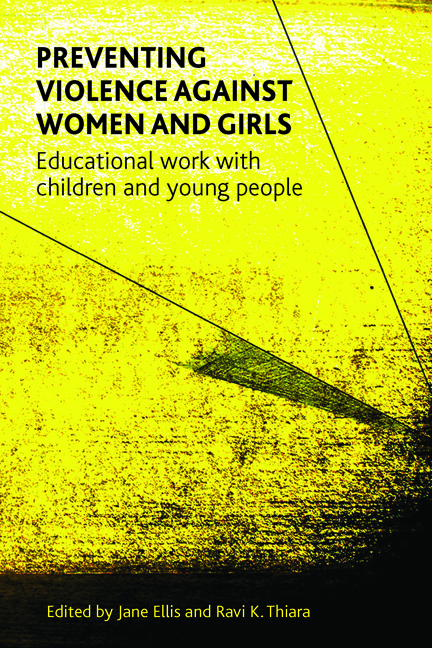Book contents
- Frontmatter
- Dedication
- Contents
- List of tables and figures
- Notes on contributors
- Acknowledgements
- Foreword
- Introduction
- one Preventing violence against women and girls through education: dilemmas and challenges
- two Does gender matter in violence prevention programmes?
- three Responding to sexual violence in girls’ intimate relationships: the role of schools
- four ‘Pandora’s Box’: preventing violence against black and minority ethnic women and girls
- five Preventing violence against women and girls: a whole school approach
- six What did you learn at school today? Education for prevention
- seven No silent witnesses: strategies in schools to empower and support disclosure
- eight Preventing sexual violence: the role of the voluntary sector
- nine ‘Boys think girls are toys’: sexual exploitation and young people
- ten MsUnderstood: the benefits of engaging young women in antiviolence work
- eleven Shifting Boundaries: lessons on relationships for students in middle school
- Concluding remarks
- Appendix: Examples of programmes in the UK
- Index
Introduction
Published online by Cambridge University Press: 04 March 2022
- Frontmatter
- Dedication
- Contents
- List of tables and figures
- Notes on contributors
- Acknowledgements
- Foreword
- Introduction
- one Preventing violence against women and girls through education: dilemmas and challenges
- two Does gender matter in violence prevention programmes?
- three Responding to sexual violence in girls’ intimate relationships: the role of schools
- four ‘Pandora’s Box’: preventing violence against black and minority ethnic women and girls
- five Preventing violence against women and girls: a whole school approach
- six What did you learn at school today? Education for prevention
- seven No silent witnesses: strategies in schools to empower and support disclosure
- eight Preventing sexual violence: the role of the voluntary sector
- nine ‘Boys think girls are toys’: sexual exploitation and young people
- ten MsUnderstood: the benefits of engaging young women in antiviolence work
- eleven Shifting Boundaries: lessons on relationships for students in middle school
- Concluding remarks
- Appendix: Examples of programmes in the UK
- Index
Summary
This collection, the first of its kind to bring together research and practice, addresses the fragmentary knowledge base on prevention work in schools on violence against women and girls (VAWG) at a time when it has received unprecedented attention. It arose out of conversations that took place between the editors about the absence of a wider critical conversation, and the lack of a discursive space, about school-based prevention work with children and young people and indeed about prevention itself – what it is, how and if it can be achieved, why is it desirable, what assumptions it makes about schools, and what view of children and young people it adopts and extends. The editors were very aware of the absence of a body of work that brought together knowledge about the disparate, and often exciting, school-based work taking place in many parts of the country. Such a body of work could also reflect on the many dilemmas and challenges faced by those at the cutting edge of developing this work and how these have been, if at all, addressed. Through drawing together researchers and practitioners in a conversation for the first time, this collection highlights the important work that has been developed thus far in this area and raises, and responds to, some of the questions that might be encountered by those seeking to take this work forward in the future. While the majority of contributors are drawn from the UK, we have included contributions from elsewhere on issues not yet written about in the UK to extend the critical conversation.
VAWG is widely considered a major social problem, the prevalence and universality of which is well documented (Abramsky et al, 2011; Council of Europe, 2011; WHO, 2013). The United Nations defines VAWG as ‘any act of gender-based violence that results in, or is likely to result in, physical, sexual or psychological harm or suffering to women, including threats of such acts, coercion or arbitrary deprivation of liberty, whether occurring in public or in private life’ (United Nations General Assembly Resolution 48/104 Declaration on the Elimination of Violence against Women, 1993). Whilst all forms of VAWG are highly under-reported, the most commonly reported and recorded forms in the UK are domestic violence, rape and sexual assault, and sexual harassment.
- Type
- Chapter
- Information
- Preventing Violence against Women and GirlsEducational Work with Children and Young People, pp. 1 - 20Publisher: Bristol University PressPrint publication year: 2014



